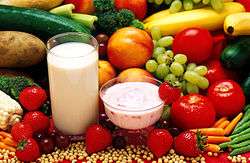Lacto vegetarianism
A lacto-vegetarian (sometimes referred to as a lactarian; from the Latin root lact-, milk) diet is a diet that includes vegetables as well as dairy products such as milk, cheese, yogurt, butter, ghee, cream, and kefir.

In India, lacto vegetarian is considered synonymous to vegetarian, while eating eggs is considered a form of non-vegetarian diet. The concept and practice of lacto-vegetarianism among a significant number of people comes from ancient India.[1] In other parts of the world, vegetarianism generally refers to ovo lacto vegetarianism instead, allowing eggs into the diet.[2]
History
An early advocate of lacto-vegetarianism was the Scottish physician George Cheyne who promoted a milk and vegetable diet to treat obesity and other health problems in the early 18th century.[3][4]
During the 19th century the diet became associated with naturopathy. German naturopaths Heinrich Lahmann and Theodor Hahn promoted lacto-vegetarian diets of raw vegetables, whole wheat bread and dairy products such as milk.[5][6][7]
In the 20th century lacto-vegetarianism was promoted by Elmer McCollum and Mikkel Hindhede.[7][8] In 1918, McCollum commented that "lacto-vegetarianism should not be confused with strict vegetarianism. The former is, when the diet is properly planned, the most highly satisfactory plan which can be adopted in the nutrition of man."[9] Hindhede a food advisor to the Danish government during World War I was influential in introducing a lacto-vegetarian diet to the public.[7][8][10] The system of rationing restricted meat and alcohol so the Danish population were mostly living on a diet of milk and vegetables. During the years of food restriction from 1917 to 1918, the mortality rate dropped by 34%, the lowest death rates ever reported for Denmark.[8] Hindehede's dieting ideas were well received amongst the right-wing political spectrum in Germany.[10]
Mahatma Gandhi was a notable lacto-vegetarian, who drank milk daily.[11] In 1931, Gandhi commented that:
I know we must all err. I would give up milk if I could, but I cannot. I have made that experiment times without number. I could not, after a serious illness, regain my strength, unless I went back to milk. That has been the tragedy of my life.[11][12]
Religion
Lacto-vegetarian diets are popular with certain followers of the Eastern religious traditions such as Jainism, Hinduism, Buddhism, and Sikhism. The core of their beliefs behind a lacto-vegetarian diet is the law of ahimsa, or non-violence.
Hinduism
According to the Vedas (Hindu holy scriptures), all living beings are equally valued.[13][14] Also, Hindus believe that one's personality is affected by the kind of food one consumes, and eating flesh is considered bad for one's spiritual/mental well-being. It takes many more vegetables or plants to produce an equal amount of meat,[15] many more lives are destroyed, and in this way more suffering is caused when meat is consumed.[16] Although some suffering and pain is inevitably caused to other living beings to satisfy the human need for food, according to ahimsa, every effort should be made to minimize suffering.[16] This is to avoid karmic consequences and show respect for living things, because all living beings are equally valued in these traditions,[14] a vegetarian diet rooted in ahimsa is only one aspect of environmentally conscious living, relating to those beings affected by our need for food.[16] However, this does not apply to all Hindus; some do consume meat, though usually not any form of beef.
Lacto-vegetarians and vegans
The primary difference between a vegan and a lacto-vegetarian diet is the avoidance of dairy products. Vegans do not consume dairy products, believing that their production causes the animal suffering or a premature death,[17] or otherwise abridges animal rights.
See also
- Lacto-ovo vegetarianism
- List of butter dishes
- List of cheese dishes
- List of dairy products
- List of diets
- List of vegetable dishes
- List of vegetarian restaurants
- Ovo vegetarianism
- Ovo-lacto vegetarianism
- Sattvic Diet
- Sentient foods
- Veganism
- Vegetarianism
- VeggieBoards, a vegetarian forum
References
- Spencer, Colin: The Heretic’s Feast. A History of Vegetarianism, London: Fourth Estate 1993, p. 69–84. ISBN 1-85702-078-2.
- "Becoming a vegetarian". Harvard Health. Oct 2009. Retrieved 18 Nov 2017.
- Kiple, Kenneth F; Ornelas, Kriemhild Coneè. (2000). The Cambridge World History of Food, Volume 2. Cambridge University Press. p. 1556. ISBN 0-521-40215-8
- Beatty, Heather R. (2012). Nervous Disease in Late Eighteenth-Century Britain: The Reality of a Fashionable Disorder. Routledge. pp. 103-104. ISBN 978-1-84893-308-8
- Bergdolt, Klaus. (2008). Wellbeing: A Cultural History of Healthy Living. Polity Press. p. 286. ISBN 978-07456-2913-1
- Puskar-Pasewicz, Margaret. (2010). Cultural Encyclopedia of Vegetarianism. ABC-CLIO. p. 116. ISBN 978-0-313-37556-9
- Treitel, Corinna. (2017). Eating Nature in Modern Germany: Food, Agriculture and Environment, c.1870 to 2000. Cambridge University Press. pp. 77-81. ISBN 978-1-107-18802-0
- Iacobbo, Karen; Iacobbo, Michael. (2004). Vegetarian America: A History. pp. 138-140. ISBN 0-275-97519-3
- McCollum, Elmer Verner (1918). The Newer Knowledge of Nutrition. Macmillan Company. p. 52.
- Sebastia, Brigitte. (2016). Eating Traditional Food: Politics, Identity and Practices. Routledge. p. 172. ISBN 978-1-138-18700-9
- Phelps, Norm. (2007). The Longest Struggle: Animal Advocacy from Pythagoras to PETA. Lantern Books. pp. 165-166. ISBN 978-1-59056-106-5
- "The Moral Basis of Vegetarianism". Speech delivered by Gandhi at a Social Meeting organised by the London Vegetarian Society, 20 November 1931.
- Bhagavad Gita 5.18 Archived 2009-09-17 at the Wayback Machine "The humble sages, by virtue of true knowledge, see with equal vision a learned and gentle brahmana, a cow, an elephant, a dog and a dog-eater [outcaste]."
- "Animals in Hinduism, second paragraph". Hinduwebsite.com. Retrieved 2014-03-14.
- "U.S. could feed 800 million people with grain that livestock eat". News.cornell.edu. 1997-08-07. Retrieved 2014-03-14.
- Gabriel Cousens, Spiritual Nutrition: Six Foundations for Spiritual Life and the Awakening of Kundalini, North Athlantic Books, page 251
- Erik Marcus (2000). Vegan: The New Ethics of Eating.
External links
| Wikimedia Commons has media related to Vegetarianism. |